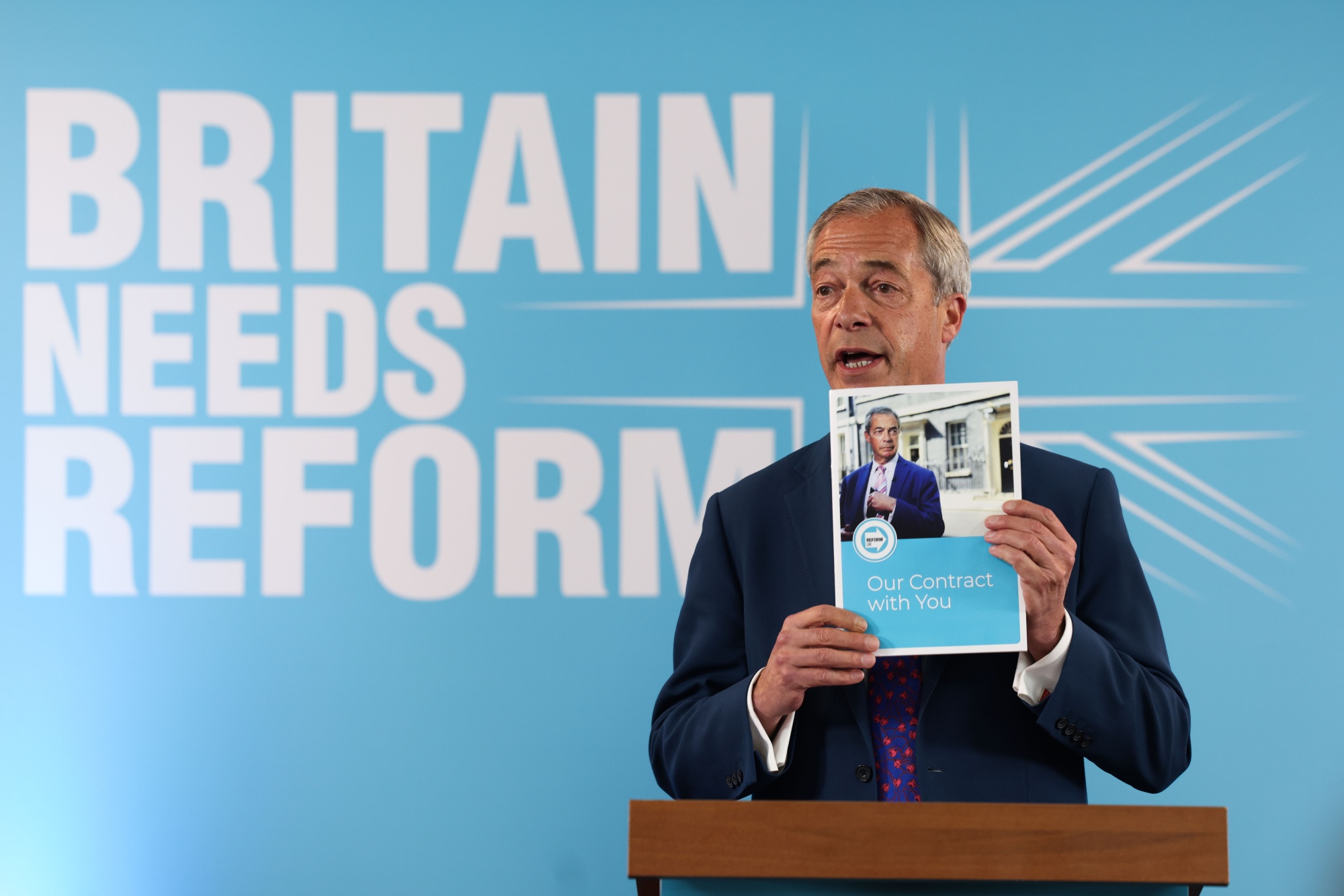Nigel Farage's Reform Party: A Crucial UK Local Election Test

Table of Contents
Key Battlegrounds for the Reform Party
The Reform Party's electoral strategy is focused on specific areas where they believe they can maximize their impact. Their targeting is highly strategic, focusing on constituencies where they believe their message will resonate most strongly. Success in these key battlegrounds will be vital in determining the overall success of their local election campaign.
-
Areas with high Leave-voting percentages in the 2016 EU referendum: Regions that strongly supported Brexit are seen as fertile ground for the Reform Party, as they capitalize on lingering frustrations with the perceived failings of the established parties regarding Brexit implementation. These areas often exhibit a strong anti-establishment sentiment, aligning with the Reform Party's core messaging. Examples include areas in the North East and Midlands of England.
-
Constituencies where traditional parties have experienced significant declines in support: The Reform Party is actively targeting areas where the Conservative and Labour parties have seen a drop in voter confidence, hoping to capitalize on voter disillusionment and attract support from those feeling abandoned by mainstream politics. This is a classic opportunistic strategy, focusing on areas ripe for disruption.
-
Areas with strong anti-establishment sentiment: The Reform Party's populist message and anti-establishment rhetoric resonate particularly well in areas with a history of distrust in traditional political institutions. This is a key demographic for their campaign, emphasizing the need for change and challenging the status quo. These are areas where the Reform Party hopes to establish a strong local presence, building a foundation for future growth.
The Reform Party's Campaign Strategy and Messaging
The Reform Party's campaign is built around a core set of messages designed to appeal to specific voter concerns. Their effectiveness in communicating these messages will be a major factor determining their success in these local elections. Their approach is characterized by a direct and often confrontational style, contrasting sharply with the more nuanced approaches of established parties.
-
Focus on immigration and border control: This remains a central plank of the Reform Party's platform, tapping into anxieties about immigration levels and border security. This is a key issue that differentiates them from their competitors, attracting voters who feel this issue is not adequately addressed by the established parties.
-
Emphasis on reducing taxes and government spending: The Reform Party's fiscal policy positions are designed to appeal to voters concerned about the cost of living and the burden of taxation. This message resonates particularly strongly with those feeling the economic pinch, positioning them as a fiscally conservative alternative.
-
Anti-establishment rhetoric targeting the Conservative and Labour parties: The Reform Party's messaging consistently critiques both the Conservatives and Labour, portraying them as out of touch and ineffective. This strategy is designed to attract voters disillusioned with the political mainstream, promising a fresh approach to governance.
Opposition Reactions and Responses
The established political parties are responding to the Reform Party's challenge with varying strategies. The outcome of these local elections will depend, in part, on the effectiveness of these responses and their ability to counter the Reform Party's message. The level of success of these strategies will influence the overall political landscape after the elections.
-
Conservative attempts to appeal to disillusioned voters: The Conservatives are attempting to win back voters who might be considering supporting the Reform Party by highlighting their own economic policies and achievements. This is a defensive strategy, aiming to prevent further erosion of their support base.
-
Labour's efforts to position themselves as an alternative to the Reform Party's populist appeal: Labour is seeking to present itself as a credible alternative to the Reform Party, focusing on social justice issues and economic fairness. This is an attempt to attract those who may be sympathetic to some of the Reform Party's concerns, but are hesitant to support such a populist movement.
-
Liberal Democrat attempts to highlight the Reform Party's extreme views: The Liberal Democrats are focusing on highlighting what they see as the extreme and divisive nature of the Reform Party's policies, attempting to discredit them and discourage voters from supporting them. This is an aggressive strategy, attempting to define the Reform Party in a negative light.
The Impact of National Political Events
The current political climate significantly impacts the Reform Party's prospects. National events and controversies create opportunities and challenges that could influence voter sentiment and impact the party's performance in these local elections.
-
The influence of the ongoing cost of living crisis: The ongoing cost of living crisis is a significant factor influencing voter choices. The Reform Party aims to capitalize on voter frustration by promoting their economic policies as a solution.
-
The impact of recent government policy decisions: Government decisions on issues such as Brexit, taxation, and public services directly affect voter perceptions and could impact the Reform Party's electoral success.
-
Public opinion on Brexit and its ongoing implications: Brexit continues to be a dominant issue in UK politics, and public opinion on its handling directly impacts the appeal of parties with different stances on the issue, with the Reform Party holding a distinctly pro-Brexit stance.
Potential Outcomes and Their Implications
Several scenarios are possible for the Reform Party in these local elections, each with significant implications for UK politics. The outcomes will profoundly impact the party's future trajectory and influence the broader political landscape.
-
Scenario 1: Significant gains suggest a growing national threat to established parties. A strong showing could signal a significant shift in the political landscape, increasing the Reform Party's influence and posing a considerable challenge to the Conservatives and Labour.
-
Scenario 2: Limited success indicates a need for strategic adjustments. Moderate gains might suggest the Reform Party needs to refine its strategy and messaging to broaden its appeal and achieve more substantial gains in the future.
-
Scenario 3: Poor performance could signal a decline in the party's influence. A disappointing performance could indicate a weakening of the party's appeal and raise questions about its long-term viability.
Conclusion
The UK local elections serve as a crucial test for Nigel Farage's Reform Party. Their performance will be a significant indicator of their potential to impact national politics in the future. The outcome will depend on a complex interplay of factors including their campaign strategies, the reactions of established parties, and the broader political climate. Analyzing these factors will be crucial for understanding the future trajectory of the Reform Party.
Call to Action: Keep an eye on the results of these local elections to gain a better understanding of the growing influence of Nigel Farage's Reform Party and its potential to reshape the UK political landscape. Further analysis of the results will be crucial in understanding the future of this political force and its continued impact on UK politics. The performance of Nigel Farage's Reform Party in these local elections will be a key indicator of their future potential.

Featured Posts
-
 Replacing Farage With Lowe A Fresh Start For Reform
May 03, 2025
Replacing Farage With Lowe A Fresh Start For Reform
May 03, 2025 -
 Ev Mandate Opposition Car Dealerships Push Back
May 03, 2025
Ev Mandate Opposition Car Dealerships Push Back
May 03, 2025 -
 Sardou Et Macron Un Diner Houleux Ca Vient Du Ventre
May 03, 2025
Sardou Et Macron Un Diner Houleux Ca Vient Du Ventre
May 03, 2025 -
 January 6th Witness Cassidy Hutchinson Announces Fall Memoir Release
May 03, 2025
January 6th Witness Cassidy Hutchinson Announces Fall Memoir Release
May 03, 2025 -
 Kellers 500 Point Milestone A Triumph For Missouri Hockey
May 03, 2025
Kellers 500 Point Milestone A Triumph For Missouri Hockey
May 03, 2025
